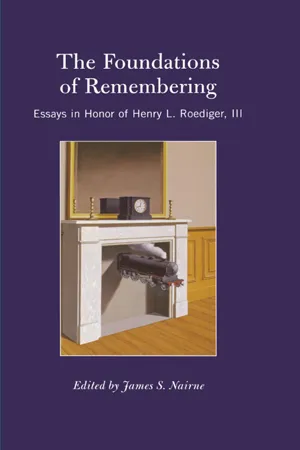
- 464 pages
- English
- ePUB (mobile friendly)
- Available on iOS & Android
About This Book
The Foundations of Remembering presents a collection of essays written by top memory scholars in honor of Henry L. Roediger III. The chapters were originally delivered as part of the "Roddyfest" conference held in March 2005 to celebrate Purdue University's awarding of an honorary doctor of letters to Roediger in recognition of his many contributions to the field of psychology.
Authors were given a simple charge: choose your own topic, but place your work in historical context. Roediger is fascinated by the intellectual lineage of ideas, so addressing historical "foundations" seemed a fitting tribute. The Chapters contained in this volume help to establish the foundations of remembering, circa the first decade of the 21st century, as perceived by some of the leading memory researchers in the world. Not surprisingly, each of the chapters touches on Roediger's research as well, largely because his work has helped to define and clarify many topics of interest to the memory field.
The Foundations of Remembering is intended for a wide audience: students, scholars, and anyone interested in exploring the historical and conceptual roots of modern memory theory.
Frequently asked questions
Information
Table of contents
- Cover
- Halftitle
- Title
- Copyright
- Contents
- Contributors
- Preface
- 1 Roddy Roediger’s Memory
- 2 Retrieval as a Self-Limiting Process: Part II
- 3 Are There 256 Different Kinds of Memory?
- 4 Foxes, Hedgehogs, and Mirror Effects: The Role of General Principles in Memory Research
- 5 Signal-Detection Theory and the Neuroscience of Recognition Memory
- 6 Is Expanded Retrieval Practice a Superior Form of Spaced Retrieval? A Critical Review of the Extant Literature
- 7 A Brief History of Memory and Aging
- 8 Making Distinctiveness Models of Memory Distinct
- 9 Unscrambling the Effects of Emotion and Distinctiveness on Memory
- 10 The Effects of Attention and Emotion on Memory for Context
- 11 Putting Context in Context
- 12 The Effects of Familiarity on Reconstructing the Order of Information in Semantic and Episodic Memory
- 13 Attentional Requirements of Perceptual Implicit Memory
- 14 Spontaneous Retrieval in Prospective Memory
- 15 Individual Differences in Working Memory Capacity and Retrieval: A Cue-Dependent Search Approach
- 16 Competition and Inhibition in Word Retrieval: Implications for Language and Memory Tasks
- 17 The Structure of Semantic and Phonological Networks and the Structure of a Social Network in Dreams
- 18 Inducing False Memories Through Associated Lists: A Window Onto Everyday False Memories?
- 19 Semantic Relatedness Effects on True and False Memories in Episodic Recognition: A Methodological and Empirical Review
- 20 The Cognitive Neuroscience of Implicit and False Memories: Perspectives on Processing Specificity
- 21 Toward Analyzing Cognitive Illusions: Past, Present, and Future
- 22 Learning from Fictional Sources
- 23 Memory Distortion: From Misinformation to Rich False Memory
- Author Index
- Subject Index